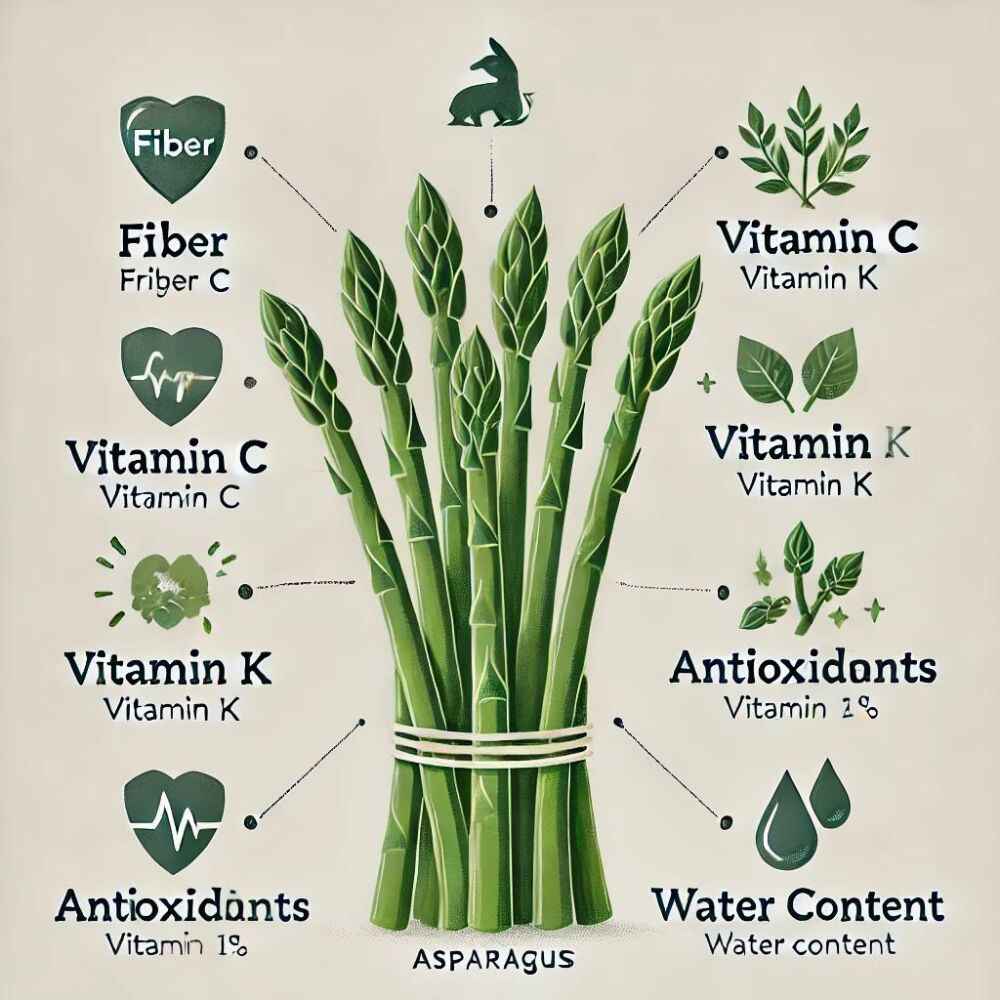Rabbits are adorable, and we all want to feed them the right stuff as pet owners. But what about asparagus? Can your furry friend munch on this green veggie without any worries?
If you’re wondering whether asparagus is safe for your rabbit or if it’s a big no-no, you’re in the right place. In this article, we’ll break down everything you need to know about rabbits and asparagus
Can Rabbits Eat Asparagus?
Yes, rabbits can eat asparagus! It’s one of the many veggies that can be part of a rabbit’s balanced diet.
However, like all foods, it should be given in moderation. While it’s safe, asparagus isn’t something rabbits would naturally find in the wild, so introducing it slowly is a good idea. Let’s explore why!
Is Asparagus Safe for Bunnies?
Absolutely! Asparagus is non-toxic to rabbits, which means it won’t harm them if you offer it in small amounts. It’s low in sugar and fat, making it a decent snack option for your bunny.
However, that doesn’t mean you should let them chow down on a whole bunch every day. Everything in moderation, right?
Nutritional Benefits of Asparagus for Rabbits

You might be wondering, “What’s in asparagus that’s good for my bunny?” Well, asparagus is packed with water, fiber, and essential vitamins like vitamin C and vitamin K, which help keep your rabbit’s system running smoothly.
It’s also a good source of antioxidants, which can protect your bunny from cell damage.
The fiber in asparagus helps with digestion, and we all know how important a healthy digestive system is for a rabbit.
Without enough fiber, rabbits can have serious stomach issues, but too much of a new food can also upset their tummies. It’s all about balance!
According to the House Rabbit Society fresh vegetables are an essential part of a rabbit’s balanced diet. Asparagus, being rich in fiber and low in sugar, aligns well with their guidelines on healthy vegetable choices.
How Often Can Bunnies Eat Asparagus?
When it comes to how often, less is more. A good rule of thumb is to offer asparagus as an occasional treat, maybe a few times a week at most.
Asparagus is a fun way to give your bunny some variety, but the bulk of their diet should still come from hay and leafy greens.
How to Prepare Asparagus for Your Rabbit
So, how do you prepare asparagus for your rabbit? It’s super simple.
- Wash the asparagus thoroughly to remove any dirt or pesticides. Even if it’s organic, you want to make sure it’s clean.
- Cut the asparagus into small pieces or strips. This makes it easier for your bunny to chew and digest.
- Serve raw. While humans sometimes cook asparagus, rabbits should only eat it raw. Cooked food is harder for them to digest and can lead to stomach issues.
How Much Asparagus Should You Feed Your Rabbit?
A small portion goes a long way! Depending on the size of your rabbit, one or two small pieces of asparagus are plenty. Remember, you’re adding this as a treat alongside their main diet of hay, which should make up about 80% of what they eat.
Dr. Alexandra Dawson, a vet who specializes in small mammals. In an interview with VetStreet, she mentions that asparagus can be included as a treat, but she advises that “it should never exceed 10-15% of the rabbit’s daily food intake, as overconsumption of veggies can lead to digestive imbalances.”
Can Baby Bunny Eat Asparagus?
When it comes to baby rabbits (under 12 weeks old), it’s best to avoid feeding them asparagus or any other new vegetable. Their digestive systems are still developing, and introducing new foods too early can cause an upset stomach.
Stick with mother’s milk and hay for now, and you can start introducing veggies like asparagus when they’re a bit older.

What Are the Risks of Feeding Asparagus to Rabbits?
While asparagus is safe, there are still a few risks to keep in mind. The biggest concern is feeding too much at once.
Rabbits have sensitive digestive systems, and large amounts of new food can cause gas, bloating, or diarrhea. Always introduce new foods slowly and in small amounts.
Another thing to watch out for is the texture. Asparagus has fibrous parts that can be tough for some rabbits to chew, so make sure you’re cutting it into manageable pieces.
Dr. John Chitty, a leading veterinary surgeon, warns about overfeeding vegetables. He explains that rabbits’ digestive systems are highly sensitive to changes, and any drastic increase in non-hay foods can upset their gut flora, potentially causing soft stool, or diarrhea.
Other Vegetable Rabbits Can Eat
Besides asparagus, there are plenty of other veggies your rabbit can enjoy. Here are a few options:
- Carrots (in moderation, since they’re high in sugar)
- Kale
- Spinach
- Cilantro
- Bell peppers
- Zucchini
Mixing it up with these different veggies will keep your rabbit’s diet interesting and nutritious.
Vegetables to Avoid for Rabbits
Not all veggies are rabbit-friendly. Some can be harmful or even toxic. Make sure to avoid feeding your rabbit:
- Onions
- Garlic
- Potatoes
- Tomatoes
- Rhubarb
These can cause serious health issues, so keep them off the menu!
Signs Your Rabbit Likes Asparagus
It’s easy to tell if your rabbit is enjoying their asparagus snack. They’ll be excited, nibbling it eagerly, and may even come running when they see you preparing it.
Every rabbit has their own personality, though, so don’t be surprised if yours turns up their nose at asparagus—some bunnies can be picky!

How to Tell if Your Rabbit Is Having Digestive Issues
Keep an eye on your rabbit after feeding them asparagus, especially if it’s their first time.
If they seem bloated, aren’t pooping as much, or are less energetic, it could be a sign that asparagus (or any new food) isn’t agreeing with them. If this happens, stop feeding it and consult your vet if the problem persists.
Can Asparagus Make Your Rabbit’s Urine Smell?
Funny enough, just like in humans, asparagus can make your rabbit’s pee smell a little stronger! It’s not dangerous, but it’s something to be aware of if you notice any changes in the litter box.
Alternatives to Asparagus for Rabbits
If your rabbit doesn’t seem too keen on asparagus, don’t worry. There are lots of other healthy veggies to choose from. Some great alternatives include:
- Romaine lettuce (avoid iceberg lettuce)
- Basil
- Parsley
- Endive
- Bok choy
All of these can be great additions to your rabbit’s diet and offer a range of flavors to keep your bunny happy.
Conclusion
So, should you add asparagus to your rabbit’s diet? Yes, but only as an occasional treat! Asparagus is a safe and healthy veggie for rabbits when given in moderation.
Always introduce new foods slowly and watch your rabbit for any signs of digestive discomfort. Mix asparagus in with other fresh greens, and you’ll have one happy, healthy bunny.
FAQs
1. How much asparagus should I give my rabbit?
Start with one or two small pieces and see how they react. If all goes well, you can offer it a couple of times a week.
2. Can asparagus upset a rabbit’s stomach?
Yes, if given in large amounts or introduced too quickly, asparagus can cause gas or digestive issues in rabbits.
3. Can rabbits eat cooked asparagus?
No, rabbits should only eat raw asparagus. Cooked vegetables are harder for them to digest.
4. What part of the asparagus can rabbits eat?
Rabbits can eat the whole asparagus stalk, but make sure to cut it into small, manageable pieces.
5. How do I know if my rabbit is allergic to asparagus?
Allergies in rabbits are rare, but if you notice any swelling, excessive itching, or difficulty breathing after feeding asparagus, contact your vet immediately.
Pingback: Do Axolotls Have Teeth? A Complete Guide to Axolotl Teeth